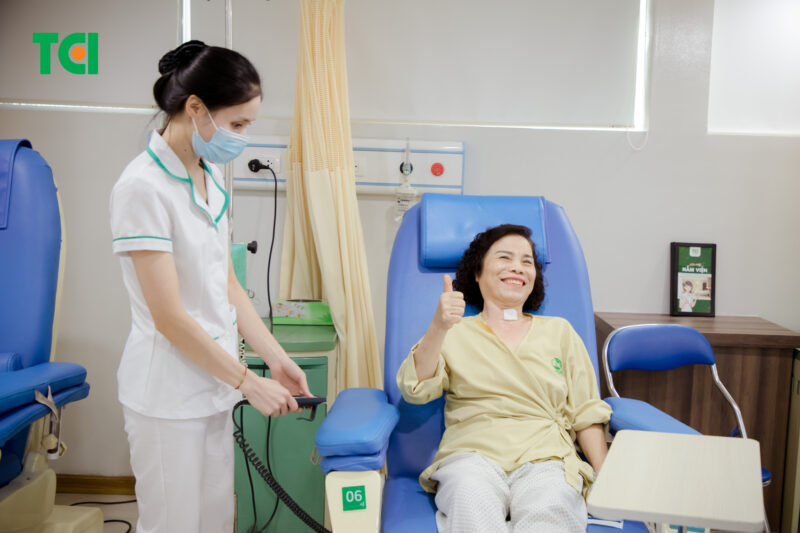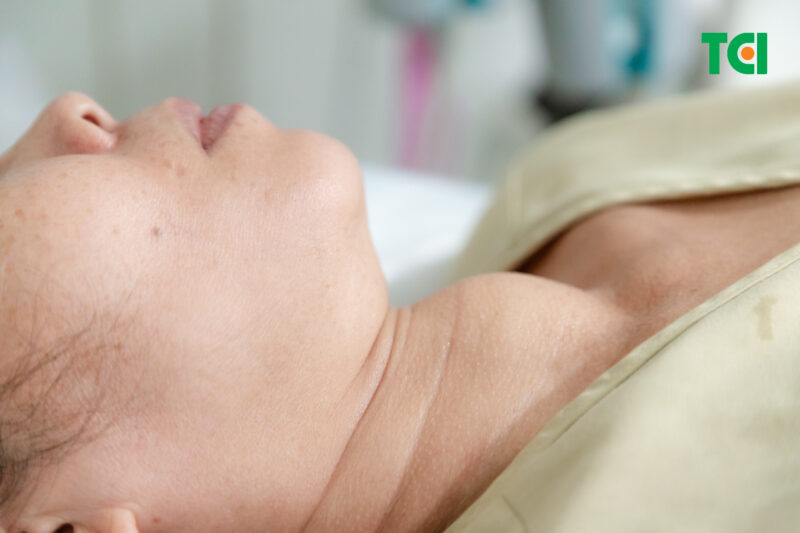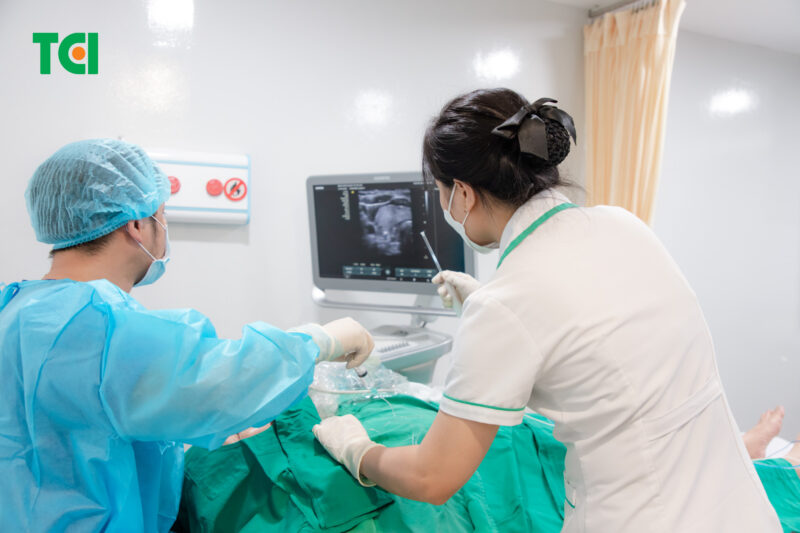Radiofrequency Ablation – RFA for thyroid nodules stands as a contemporary and effective method utilized in the management of thyroid disorders, particularly benign thyroid nodules.
1. Understanding RFA for Thyroid Nodules
Radiofrequency Ablation (RFA) emerges as a modern medical technique designed to eradicate abnormal thyroid tissue masses. It constitutes a minimally invasive approach, often favored over traditional open surgery in select patients.
During an RFA procedure, a fine needle is precisely inserted into the nodular center of the thyroid, aided by ultrasound guidance for accurate positioning. Electrical currents are then passed through the needle, generating temperatures of approximately 60-100°C to destroy target tissues. The needle shaft is water-cooled to ensure safety, minimizing impact on surrounding healthy tissues.
2. Advantages of Radiofrequency Ablation for Thyroid Nodules
2.1. Minimal Invasion
RFA represents a modern, minimally invasive solution for benign thyroid nodules. By utilizing high-frequency waves, it enables targeted tissue access without the need for extensive skin incisions, reducing infection risks and patient discomfort.
2.2. Minimal Scarring
The treatment process leaves minimal scarring, offering aesthetic benefits to patients. This aspect is particularly significant for individuals concerned about post-treatment cosmetic outcomes.
2.3. High Treatment Efficacy
This method yields high effectiveness in reducing thyroid nodule size, alleviating symptoms, and maintaining thyroid function.
2.4. Time and Cost Savings
Typically, this minimal invasive procedure lasts only 1-2 hours, resulting in shorter hospital stays. This aspect contributes to cost savings and alleviates financial burdens on patients.
2.5. Safety and Preservation of Healthy Thyroid Tissue
Local anesthesia and radiofrequency ablation are conducted with high safety standards, reducing risks to surrounding tissues and preserving healthy thyroid tissue.
2.6. Quick Recovery with Minimal Fatigue
Patients can return home shortly after treatment and resume normal activities. Radiofrequency ablation facilitates rapid recovery, enabling patients to resume their daily routines promptly.
2.7. Preservation of Thyroid Function
This method maximally preserves thyroid function, ensuring minimal disruption to hormone production and supply, thus promoting overall health maintenance.
2.8. Reduced Risk of Complications and Hoarseness
By minimizing the risk of nerve injury and complications associated with traditional thyroid surgery, radiofrequency ablation offers improved safety and post-operative outcomes.
RFA for thyroid nodules not only represents a modern and safe option but also offers numerous benefits to patients, ranging from cosmetic concerns to thyroid function preservation and treatment convenience.

Patients return to normalcy after undergoing RFA of the thyroid gland.
3. Indications for RFA in Thyroid Nodules
3.1 Suitable Cases for Thyroid RFA
– Patients with prominent thyroid nodules causing cosmetic concerns and discomfort.
– Patients experiencing symptoms such as difficulty swallowing, coughing, or discomfort due to nodules compressing vital structures like the esophagus and trachea.
– Cases of thyroid hot nodules leading to clinical hyperthyroidism, resulting in elevated thyroid hormone levels and associated symptoms.
– In early-stage thyroid cancer cases without metastasis (T1NoMo), radiofrequency ablation may be considered.
– For cases of thyroid cancer recurrence immediately post-surgery or in situ metastasis, radiofrequency ablation can reduce recurrence risk and provide high efficacy.

Radiofrequency ablation is an effective treatment method for benign thyroid nodules.
3.2 Contraindications for Thyroid RFA
– Pregnant women are generally advised against radiofrequency ablation to avoid fetal risks.
– Individuals with severe cardiovascular issues may have relative contraindications due to the method’s impact on the cardiovascular system.
– In cases where the patient has unilateral vocal cord paralysis, treatment may increase the risk of hoarseness and infection.
Before opting for radiofrequency ablation, patients should undergo thorough evaluation by healthcare professionals. Comprehensive tests and examinations aid in determining the suitability of this method for the patient’s health condition and specific thyroid status.
4. Radiofrequency Ablation Procedure
4.1. Preparation
After clinical assessment and test results, patients are prepared for the intervention. Detailed information regarding radiofrequency ablation and its benefits is provided, and patient commitment to participation is secured.
5.2. Intervention Execution of RFA for Thyroid Nodules
A Radiologist utilizes ultrasound to pinpoint the exact location and size of the thyroid nodule. Fine-needle aspiration (FNA) is performed to determine the nature of the nodule (benign or malignant).
Before radiofrequency ablation, the neck area is sterilized, and local anesthesia with Lidocaine is administered. Ultrasound guidance ensures accurate delivery of electrical currents to the nodular tissue during radiofrequency ablation.
Each radiofrequency ablation session lasts approximately 1-2 hours. Patients under local anesthesia can interact with the Radiologist during the procedure. For each nodule, radiofrequency ablation is performed once, although multiple sessions may be necessary if required.

RFA for thyroid nodules is guided by ultrasound.
5.4. Postoperative Monitoring
– Patients rest post-procedure for observation for 30-60 minutes before being discharged to resume normal activities.
– Typically, a reduction in thyroid nodule volume is observed within 9-12 months. In cases of inadequate results, a second radiofrequency ablation session may be performed.








